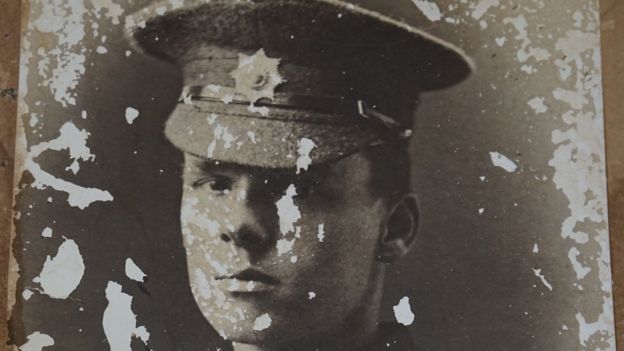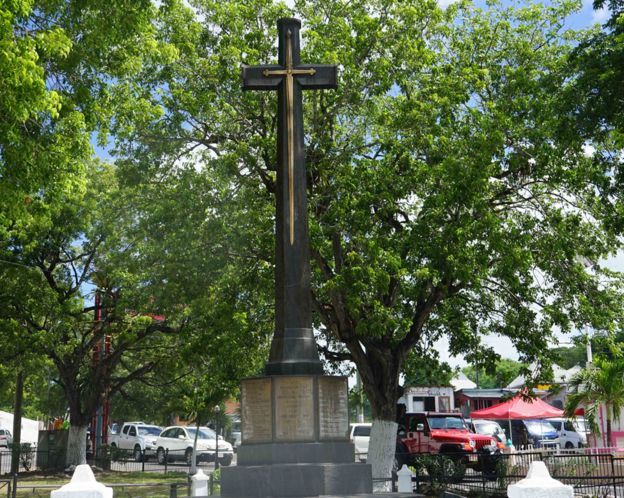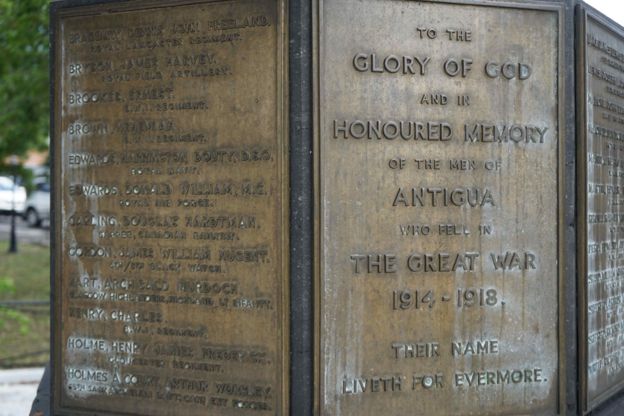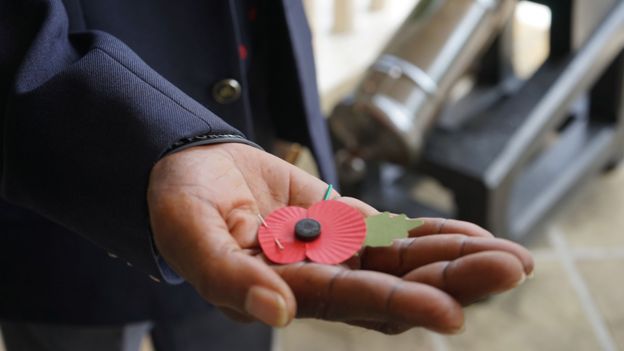The Caribbean honours its overlooked WW1 soldiers
Ask ex-servicemen in Antigua and Barbuda about their country’s contribution to World War One efforts and the response will be delivered with ample pride and a touch of pique.
This Remembrance Sunday at 11:00, as they do every year, they will join their counterparts around the world and gather at the nation’s Cenotaph to commemorate their fallen, but overlooked, heroes.
Precisely a century since the Great War ended, the stories of the Europeans who fought for freedom are well documented.
Far less is known about the 16,000 men and women from the Caribbean who voluntarily enlisted.
These nameless men and women of colour have been “airbrushed” from history, says Keith Eastmond, of the twin island nation’s Ex-Servicemen’s Association.
“We have no definitive number for how many people from Antigua and Barbuda joined the war efforts,” he tells the BBC.
‘Keen volunteers’
“The Caribbean was keen to support the mother country, as they saw it then,” he continues. “But Britain was reluctant to let West Indian soldiers fight white Europeans in those days.”
The region’s pleas to assist initially fell on deaf ears. It was not until the need for extra manpower grew so great that King George himself called on the Caribbean colonies to help.
In October 1915, the British West Indies Regiment (BWIR) was formed. Two-thirds of its men were from Jamaica, the rest hailing from the Bahamas to then British Guiana.
Despite receiving a heroes’ welcome when they arrived in England, the Caribbean soldiers were not permitted to fight as equals alongside their white counterparts.
Most served for lower pay in the Labour Corps transporting ammunition, digging trenches, building roads and railway lines. The backbreaking work was often carried out within range of German artillery and snipers, resulting in several deaths.
Perilous work
It was dangerous in other ways too; a common task was extinguishing fires in burning, sometimes already exploding, ammunition dumps.
 Image copyrightANTIGUA & BARBUDA EX-SERVICEMEN’S ASSOCIATION
Image copyrightANTIGUA & BARBUDA EX-SERVICEMEN’S ASSOCIATIONThe Caribbean soldiers were later praised for their high morale and cheerful demeanour in the face of exhausting toil. Tales of their might include an instance of 60 men moving 375 tonnes of ammunition in just two hours.
Among the first Caribbean casualties to return home were those aboard troop ship SS Verdala, diverted via Halifax, Canada, while en route to England to avoid German U-boats.
The freezing conditions and inadequate uniforms saw more than 100 men suffer amputations of frostbitten fingers and limbs.
“Blacks were begrudgingly accepted into the war effort, but their support was absolutely essential,” says Ex-Servicemen’s Association chairman Pagget Messiah. “Without it, the outcome would have been very different.”
For many, the significance of the BWIR’s participation goes deeper still.
“The history of the Caribbean’s contribution is also the history of our social struggles for acceptance as part of the human race,” Mr Messiah continues. “The war heralded a major step towards the freedoms we enjoy today, a slackening of colonial reins and our people’s ascent into various administrative roles in their homeland.”
The BWIR had lost around 1,200 men by the time the war ended in 1918, less than 200 in combat, the rest from disease. It also earned 81 medals for bravery.
Little-known stories
It is not just the wider world that fails to recognise their sacrifices but often those on home soil too for whom the benefits were less apparent, Mr Messiah says.

 Image copyright GEMMA HANDY
Image copyright GEMMA HANDY Image copyright GEMMA HANDY
Image copyright GEMMA HANDY
Last month, an exhibition in honour of the war’s centenary opened in the nation’s capital St John’s.
The aim is to “highlight the little-known stories of our people who have been extinguished from history for 100 years”, Governor-General Rodney Williams explained.
It also sheds light on the valuable roles played by women, said his wife Lady Sandra Williams.
“Women of every island supported the cause in several different ways; fundraising for the Red Cross, putting together medical supplies and other provisions, serving as nurses to returning troops and even donating their wages as labourers to the war efforts,” she added.
Remembering their sacrifice
Today, the names etched into the brass on the national war memorial are just a fraction of those lost in World War One. Most are from World War Two, to which many Antiguans and Barbudans again voluntarily enlisted.
 Image copyrightGEMMA HANDY
Image copyrightGEMMA HANDYIndependence was still four decades away when Maurice Appleton, one of the country’s two surviving WW2 veterans, now 92, signed up.
“We were part of Britain then and I felt British,” he recalls. “I was stationed in Antigua on general army duties. We wanted to help what we thought of as our country.”
Meanwhile, research continues to fill in the estimated dozens of names missing from Antigua’s Cenotaph.
Those belonging to 22 Barbudans killed in World War Two were uncovered in recent years, along with a further 15 Antiguans.
Association members know they may never identify all those lost in the 1914-1918 conflict. But they are determined to bring into focus the sacrifice of those who, despite a fractured history with colonial Britain, left homes and families and gave lives in loyalty to the mother land.
TOP IMAGE: Ex-servicemen in Antigua think the contribution of Caribbean soldiers to WW1 has been overlooked. GEMMA HANDY
For more on this story go to: https://www.bbc.com/news/world-latin-america-46110120






